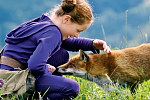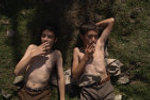 Shadows off the beaten path
Shadows off the beaten pathSAKURAN | TIMES AND WINDS
< < F O R E I G N > >
last update 31.Aug.08
See also: SHADOWS FILM FESTIVAL
 R E V I E W B Y R I C H C L I N E
R E V I E W B Y R I C H C L I N E
with Leslie Cheung, Tony Leung Ka Fai, Jacky Cheung, Brigitte Lin, Tony Leung Chiu Wai, Maggie Cheung, Bai Li, Charlie Yeung, Carina Lau, Collin Chou

release Chn Jun.08 sff,
UK 12.Sep.08,
US 10.Oct.08
94-08/China 1h33
CANNES FILM FEST
 Wong reconstructs his 1994 film, a story of honour and regret in a surreal ancient China that resembles a metaphysical Western--evocative and also a bit cold. But it's so beautifully filmed that we don't mind.
Wong reconstructs his 1994 film, a story of honour and regret in a surreal ancient China that resembles a metaphysical Western--evocative and also a bit cold. But it's so beautifully filmed that we don't mind.
Ouyang Feng (Leslie Cheung) lives in the middle of the desert, still hurt that his beloved (Maggie Cheung) married his brother instead of him. He works as a middleman, hiring swordsmen to carry out acts of revenge. His friend Huang (Leung Ka Fai) visits him each spring, and over the course of the year, he's caught up in stories of a duelling brother and sister (Lin), a blind swordsman (Leung Chiu Wai), a shoeless fighter (Jacky Cheung) and three women (Li, Lau and Charlie Yeung) connected to them.
The film is assembled like a swirl of memories, including action sequences that are shot in an impressionistic style with jarring camera angles, slow motion and fragmented editing. This gives them a kind of wild, realistic tone while also making the violence provocatively realistic. On the other hand, it distances us from the emotions that are trying to surge off the screen.
At least the images are spectacular, as Christopher Doyle's lush photography finds beauty in every dusty view of the sand-swept landscape, most notably in the rippling costumes and trailing hair. Meanwhile, the actors give intriguingly internalised performances that hint at all kinds of turmoil, as their pasts refuse to stay buried. Indeed, a central theme is that memory is one of the greatest weaknesses about being human.
All of this is infused with a strong sense of the earth and sky, as well as the passing seasons that punctuate the story and telling hints of things to come. Happiness and sadness seem always just out of reach for these people, as love infuses their lives and yet refuses to flower into expected joy. This was an extremely ambitious project for Wong; he made his breakthrough Chunking Express during a break in post-production, sending his career in a very different direction. So it's doubly interesting that he revisits it now, turning it into one of this year's most challenging films.
31.Aug.08
 R E V I E W B Y R I C H C L I N E
R E V I E W B Y R I C H C L I N E Le Renard et l’Enfant
Le Renard et l’Enfant
scr Luc Jacquet, Eric Rognard
narr Isabelle Carré (French), Kate Winslet (English)
with Bertille Noël-Bruneau, Isabelle Carré, Thomas Laliberté

release Fr 12.Dec.07,
UK 8.Aug.08
07/France 1h32
 Gorgeously scenery and a virtually dialog-free script lends this film an almost fairy tale quality that makes the most of the astonishing camerawork. And this almost makes it bearable as it heads into a rather cloying finale.
Gorgeously scenery and a virtually dialog-free script lends this film an almost fairy tale quality that makes the most of the astonishing camerawork. And this almost makes it bearable as it heads into a rather cloying finale.
A 10-year-old redhead girl (Noel-Bruneau) lives in a picture-postcard mountain woodland, where she diverts into the wild every day on the way home from school. One autumn afternoon, she spots a fox that sparks her interest and imagination. Over the next year, she obsesses about the fox, waiting until spring to earn its confidence and give it a name. But she has lessons to learn about nature--from the fox, the other animals and the physical danger all around her. As well as from the culture clash between foxes and humans.
Director Jacquet (March of the Penguins) establishes a fantasy storybook tone with continuous narration (by Winslet in the English version) that's cute and somewhat contrived. Meanwhile, the woods seem a bit too creature-filled for a little girl to be wandering through. In addition to the fox, there are deer, badgers, hawks, mountain lions, wolves and a bear living among the waterfalls, caverns, cliffs and lakes as the seasons pass from crunchy autumn through deep-snowy winter to colourful spring.
And here's one problem: conveniently for the story, the girl breaks her foot right before the snow falls, then can't go outside again until the spring. This kind of plot contrivance happens frequently as the movie progresses, clearly made up based on the nature footage available to the film editor. In other words, the narrative is barely adequate, and will only work with very young viewers. Meanwhile, the adults will begin to worry that this little girl needs serious psychological help.
That said, there are some terrific sequences along the way, and it's photographed with extraordinary skill. A couple of scenes are actually rather scary, while others are sweet or cautionary: don't try this at home, indeed. And when the film's message kicks in, it feels a bit underdeveloped, as the little girl struggles to grasp the fact that foxes aren't human. Surely, she couldn't be this naive living with such a breathtaking spread of raw nature as her backyard.
3.Jun.08
 R E V I E W B Y R I C H C L I N E
R E V I E W B Y R I C H C L I N E
scr Yuki Tanada
with Anna Tsuchiya, Masanobu Ando, Yoshino Kimura, Kippei Shiina, Hiroki Narimiya, Sadanji Ichikawa, Masatoshi Nagase, Miho Kanno, Kenichi Endo, Megumi Yamaguchi, Ayame Koike, Mari Natsuki
 release Jpn 7.Dec.06,
release Jpn 7.Dec.06, UK 29.Aug.08
06/Japan 1h51
BERLIN FILM FEST
 With a lurid colour palette and a jarringly anachronistic tone, this film tells a story similar to Memoirs of a Geisha, only with genuine Japanese culture and a sense of edgy life to it that the other film never got close to.
With a lurid colour palette and a jarringly anachronistic tone, this film tells a story similar to Memoirs of a Geisha, only with genuine Japanese culture and a sense of edgy life to it that the other film never got close to.
In 18th century Japan, an 8-year-old girl (Koike) is sold to the Tamagikuya brothel and given the name Kiyoha. Her fiercely stubborn attitude is there from the start; she doesn't want to become an oiran like Takao (Kimura), even though that's her destiny. As a young woman (Tsuchiya), she enters the business, falling for one handsome young man (Narimiya) and being offered legitimacy by a samurai lord (Shiina). But neither of these options is the full escape promised by a young servant (Ando) who acts as her protector.
Based on a manga comic, this film is so full of attitude that it fairly leaps off the screen with claws bared. The reds and oranges are both sumptuous and glaring, the music is both lyrical and grating, the characters are all surprising in the way they approach the rigid structures of their culture. Most have given in to the realities of life--this is just how it is--but Kiyoha refuses to just accept her lot. And her rock-n-roll approach to life frightens as many people as it attracts.
With dark, detailed performances and superb dialog, the film really gets under the pristine surfaces of this setting, using goldfish as a telling metaphor for women trapped in a place where they look utterly beautiful. But outside, in the river, they'll just turn into carp. And the title refers to the cherry blossoms that mark Kiyoha's arrival and are the promised herald of her longed-for departure.
The storytelling itself is a lot more problematic, unfurling in a fractured way that makes it frequently difficult to follow as it cycles through hope and humiliation, love and anguish, over and over again. But the bleak message that there's no way she can ever have a happy life is quietly, subtly undermined, balancing the despair of Fellini's Cabiria with the before-her-time determination of Coppola's Marie Antoinette. An intriguing, jumbled concoction.
24.Aug.08
 R E V I E W B Y R I C H C L I N E
R E V I E W B Y R I C H C L I N E Bes Vakit
Bes Vakit
with Ozkan Ozen, Ali Bey Kayali, Elit Iscan, Bülent Emin Yarar, Nihan Asli Elmas, Selma Ergeç, Tilbe Saran, Sevinç Erbulak, Taner Birsel, Tarik Sönmez, Köksal Engür, Yigit Ozsener
 release Tur 29.Sep.06,
release Tur 29.Sep.06, US 11.Jan.08,
UK 29.Aug.08
06/Turkey 1h51
TORONTO FILM FEST
 Evocative and fascinating, this Turkish drama is too surreal and symbolic to fully connect with mainstream cinema audiences, but lovers of challenging festival films will be captivated by the vivid world it creates.
Evocative and fascinating, this Turkish drama is too surreal and symbolic to fully connect with mainstream cinema audiences, but lovers of challenging festival films will be captivated by the vivid world it creates.
In a remote village on the Turkish coast, three pre-teens are trying to cope with the results of generations of inbreeding. Omer (Ozen) is so angry with his father (Yarar), the local imam, that he wishes he would die. His best pal Yakup (Kayali) has a crush on their young teacher (Ergec), but finds his respect for his father so destroyed that he also wishes him dead. And Yildiz (Iscan) basically runs the entire house for her mother (Elmas), including taking care of her infant brother.
Filmmaker Erdem creates an intriguing poetic tone, using the small, windswept community beautifully to convey themes far beyond the interwoven plotlines. It's extremely symbolic, examining the clash of generations using evocative images and sequences that are both hilarious and harrowing. Much of the film features no dialog at all, as the camera captures expressive faces and landscapes in anecdotal scenes that relate to each other thematically and create a kind of through-story. But it's more about the culture than the people themselves.
This is a place in which a person's entire extended family lives within walking distance--grumpy old men and cheeky young boys. The young people are curious about everything, fighting with their parents about the old attitudes, including double standards for men and women, while unable to escape deep-rooted sexism. For example, when the giggling boys spot inquisitive girls watching horses mate, they chase the girls away because it's unacceptable.
With its sprawling cast of apparently random characters and elusive emotions, this is not an easy film to grab hold of. The beautiful images, vivid acting (by non-professionals) and gently unstructured style are startlingly undercut by an eerily dark tone that suggests hatred and death lurking not far under the surface. The raw beauty of the countryside sits in sharp contrast to the turbulent characters. And for viewers who stick with it, there's a strong kick in the way it examines how each generation has to fight to make its own way.
11.Jun.08


See also: SHADOWS FILM FESTIVAL
© 2008 by Rich Cline, Shadows
on the Wall